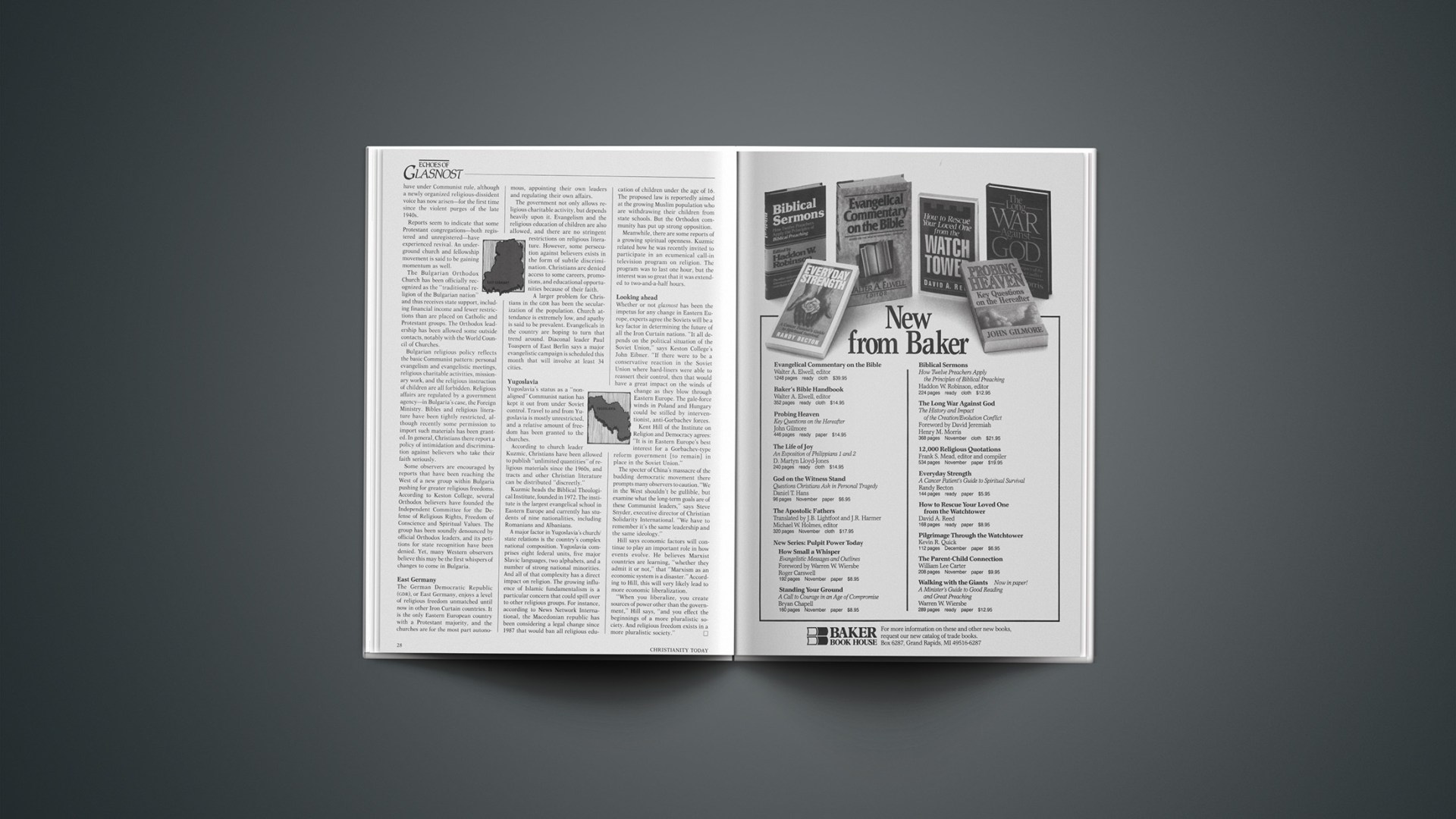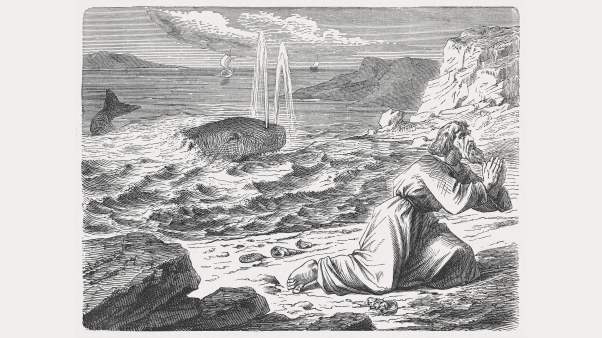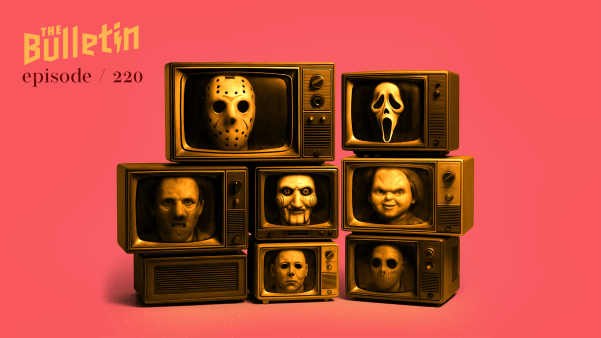An exclusive look at Charles Colson’s response to our collapsing culture
CHARLES COLSON WITH ELLEN SANTILLI VAUGHN1Charles W. Colson is chairman of Prison Fellowship, a regular columnist and contributing editor for Christianity Today, and the author of many books, including Against the Night, from which this essay was adapted.
We live in a new dark age. Having elevated the individual as the measure of all things, modern men and women are guided solely by their own dark passions; they have nothing above themselves to respect or obey, no principles to live or die for. Personal advancement, personal feeling, and personal autonomy are the only shrines at which they worship.
The reigning god of relativism and the rampant egoism it fosters coarsen character, destroy any notion of community, weaken civility, promote intolerance, and threaten the disintegration of those very institutions necessary to the survival and success of ordered liberty. “We have committed what to the republican founders of our nation was the cardinal sin,” says Robert Bellah. “We have put our own good, as individuals, as groups, as a nation, ahead of the common good.”
T. S. Eliot said there were two ways of looking at a crumbling culture. The first says that a society ceases to be Christian when material prosperity becomes its overriding individual and corporate aim. The second viewpoint maintains that a society has not ceased to be Christian until it becomes something else. Eliot believed that the culture of his day, the 1940s, was predominantly negative yet still Christian. The choice for the future, he said, was between the formation of a new Christian culture or the acceptance of a pagan one.
I believe that the decades since Eliot wrote those words have tipped the balance. Vestiges of Christian influence still remain; but those Christian absolutes that have so profoundly shaped Western culture through the centuries are being consciously rejected by the men and women who direct the flow of information and attitudes to popular culture: communicators, educators, writers, and lawyers. As Eliot put it, “Paganism holds all the most valuable advertising space.”
The Great Nightfall
This cultural crisis is all the more sinister because it is invisible to those who have already become captive to its lie. Radical individualism, which has brought us to this critical juncture, blinds most people to the fact that there is a crisis. Freed from the archaic impediments of family, church, and community, these men and women cannot see how their liberty has enslaved them to alienation, betrayal, loneliness, and inhumanity.
They have grown so accustomed to the dark, they don’t even realize the lights are out.
G. K. Chesterton accurately described their plight: “There are commonwealths, plainly to be distinguished here and there in history, which pass from prosperity to squalor, or from glory to insignificance, or from freedom to slavery, not only in silence, but with serenity. The face still smiles while the limbs, literally and loathsomely, are dropping from the body. These are people that have lost the power of astonishment at their own actions.”
Whittaker Chambers, the skeptic-turned-Christian who saw our century first as a Communist spy and then as an impassioned defender of the West, died despairing: “It is idle to talk about preventing the wreck of Western civilization. It is already a wreck from within. This is why we can hope to do little more now than snatch a fingernail of a saint from the rack or a handful of ashes from the fire, and bury them secretly in a flower pot against the day, ages hence, when a few men begin again to dare to believe that there was once something else, that something else is thinkable, and need some evidence of what it was and the fortifying knowledge that there were those who, at the great nightfall, took loving thought to preserve the tokens of hope and truth.”
Perhaps the barbarians have already won. Perhaps the great nightfall will soon be upon us. Theologian Donald Bloesch proposes that it may be out of the utter destruction of culture that the church will emerge, phoenixlike, from the ashes. We don’t know.
But one thing we do know: It is not necessary that such predictions come to pass. As Christians we cannot be historical determinists. There are no inexorable elements propelling history. God is sovereign over human events.
Yet it is men and women, under his jurisdiction, who write the pages of history through the sum of their choices. We never know what minor act of hopeless courage, what word spoken in defense of truth, what unintended consequence might swing the balance and change the world. “The death of a man at a critical juncture, his disgust, his retreat, his disgrace, have brought innumerable calamities on a whole nation. A common soldier, a child, a girl at the door of an inn, have changed the face of fortune, and almost of Nature,” said Edmund Burke.
The man who died at a critical juncture was Pericles, the Athenian general who shaped his culture; the man who retreated was Prime Minister Pitt on his retirement from public life. The child was 12-year-old Hannibal, taking an oath to attack Rome one day; and the girl at the inn was Joan of Arc.
History pivots on the actions of individuals, both great and ordinary. In this regard one cannot help thinking of Esther, the young Israelite woman who married into royalty just when evil men were plotting the annihilation of the Jews in the fourth century B.C. Her uncle urged her to plead with her husband the king to save her people; when Queen Esther faltered, he added his famous remonstration: “Who knows but that you have come to royal position for such a time as this?”
Esther prayed and found her courage renewed, despite knowing she might die. Friends and officials had been executed for provoking her husband’s wrath. Nevertheless, she went to him, leaving her uncle the message: “I will go to the king, even though it is against the law. And if I perish, I perish.”
Esther did not perish. Her decision to act, without knowing the outcome, changed the history of an entire race.
But it is not the prospect of success nor some grand vision of changing history and saving the world that should motivate the Christian. No, it is duty alone that should compel us to act in the arena in which God has placed us.
But the question remains: How do we respond to the invasion of the new barbarians? If the forces arrayed against us are so formidable, is there any hope?
Monastic Lights
Before Rome’s fall, its citizens had lost the characteristics that had made them distinctly Roman: discipline, respect, and obedience. Incest and adultery had invaded many families, breaking the natural bonds of love and commitment and setting yokes of bitterness, disdain, and hatred in their place. Moral education had been supplanted by indolence, corruption, and decadence.
Thus damaged from within, Rome was unable to resist direct barbarian assaults from without. The once-great empire fell in the fifth century, and Rome was sacked by the Visigoths, a Germanic tribe whose cavalry proved superior to the foot soldiers who had sustained and advanced the Roman empire for centuries. During the next few centuries, chaos ruled Europe. Warring bands of illiterate Germanic tribes opposed and deposed one another. Cities and cultural centers disappeared as inhabitants were scattered across the land in crude huts and rough towns. Literacy, law, and order—the pillars of civilization—crumbled, and the aristocratic culture of the ancient Western world nearly disappeared. Early medieval Europe seemed destined for complete barbarism.
One force prevented this: the church.
Instead of conforming to the barbarian culture of the Dark Ages, the medieval church modeled a counterculture to a world engulfed by destruction and confusion. Monastic orders spread across Europe, characterized by discipline, creativity, and a coherence and moral order lacking in the world around them. Monks preserved not only the Scriptures but classical literature as well; they were busy not only at their prayers but in clearing land, building towns, and harvesting crops. When little else shone forth, these religious provided attractive models of communities of caring and character; and in the process, they preserved both faith and civilization itself.
During the seventh century while corruption flourished in France under the Merovingian kings, the clergy were “the ablest, best educated, and least immoral element in Gaul,” states Will Durant. The French monks ran schools and labored to transmit both literacy and moral teaching to the masses. The bishops sheltered orphans, widows, and slaves. They opened hospitals, constructed aqueducts, banned witchcraft, and were looked up to by a population staggering under the greed and dishonesty of their political leaders.
In Ireland, the great saints Columba and Columbanus organized monasteries. Their novices illuminated manuscripts and converted pagans “with the Bible in one hand and classic manuscripts in the other,” notes historian Paul Johnson. They cleared forests, plowed fields, fasted, prayed, and lived lives of vigorous discipline.
In England, the religious orders fought illiteracy, violence, lechery, and greed. They drained swamps, bridged creeks, cut roads; they copied manuscripts, organized industrial centers and schools. By holding onto such vestiges of civilization—faith, learning, and civility—these monks and nuns held back the night, and eventually Western civilization emerged from the Dark Ages into a renewed period of cultural creativity, education, and art. The barbarians could not withstand this stubborn preservation.
It is important to note that the church challenged not only the values of the barbarians but those of the Roman Empire as well. Living by a value system dictated by the kingdom of God, they rejected both Roman and barbarian lapses of character, uprooting such attitudes as the aversion to physical labor predominant among the Roman masses and the barbarian love of violence. As points of light in a dark age, they called attention to the values of an endless age. And in so doing, they saved their civilization.
Pinstriped Barbarians
Though the world now appears far more sophisticated than when the Visigoths overran Rome, it is only because today’s barbarians wear pinstripes instead of animal skins and wield briefcases rather than spears. Like the monastic communities of the Middle Ages, the churches of today can serve as outposts of truth, decency, and civilization in the darkening culture around us. For even though the church itself is shot through with an individualism that cripples its witness, even though the church is made up of sinners, it is the one social institution that is still capable of challenging culture by bearing witness to God’s transcendent standards of absolute justice and righteousness.
Why? Because the church has an independent locus of authority beyond itself, beyond the state, beyond the tides of passing fashion. The true church cleaves to the absolute standards of Scripture and is infused with the guidance of the Holy Spirit.
I refer not to any particular denomination, but to the church as the body of Christ: what the apostle Peter called “the holy nation”; what the Apostles’ Creed calls “the holy catholic church.” It is that community of God’s people of every race spread around the globe that makes visible the kingdom of God in the midst of the kingdoms of this world.
A historian, Christopher Dawson, has pointed out, the church has been the soul of Western civilization. And that is the church’s role today: to take its stand as the main line of resistance against the new barbarians and to provide culture with a new sense of moral vision. But it is crucial that we pause here to emphasize and understand a great paradox: If the church is to fulfill its role, if the church is to do anything at all useful for culture, if the church is to resist and conquer the barbarian invaders, the church must first disregard all these objectives and concentrate on being faithful to its identity in Jesus Christ. The church must be the church. That is its first duty.
Called To Obey
If we set out to recapture culture, seeing the church as God’s instrument to save the world, we will fail—just as the conservative Christian political movement has failed, just as liberal Christian social movements have failed. The church is not a tool to rebuild society.
Our goal is to be faithful to the holy God who calls us to be the church, whether we actually make a difference in our world or whether it falls to pieces around us and dissolves into a stew of secularism. We seek to be the church for no other reason than that it is our calling from God. We defend the independence and faith of the church because it is the body of Christ, the locus of spiritual authority, the bride preparing for the coming of the Groom.
In anticipation of our Master’s return, Christians are to be committed to biblical obedience, which means working for justice and righteousness, serving as advocates for the needy and powerless who cannot speak for themselves. When we are faithful to the challenges of Matthew 25 (feeding the hungry, welcoming the stranger, clothing the naked, helping the sick, visiting the imprisoned) or the prophetic exhortations of Amos, we cannot help making a positive impact on society.
But, again, this is not why we are faithful. We are motivated not by a desire to make an impact on society but by obedience to God’s Word and a desire to please him. When our goal becomes success rather than faithfulness, we lose the single-minded focus of obedience and any real power to be successful.
For years the slogan of the National Council of Churches was “the world sets the agenda for the church.” This sounds socially relevant, but, in fact, it displaces God, who long ago set his own agenda for his church. Only when the church abandons its worldly pretensions does it gain its greatest influence, says religious commentator Richard John Neuhaus: “The church best serves the world when it is most distinctively and most unapologetically the church.… When the church dares to be different, it models for the world what God calls the world to become. The church models what it means to be a community of caring and a community of character.”
This is not to suggest for a moment that the church should turn its back on the world or retreat to monastic outposts. I would be the first to argue that we have a duty to proclaim the truth, to act as salt and light, to hold the world to moral account. It is all a matter of motivation. When we act out of social or political motives, we can easily become frustrated. But when we act out of pure obedience, then God may well use the church to influence social and political structures profoundly.
Dawson argues that historically the church has provided the principal dynamic of social change in the West only when it has been most distinctly the church. He notes that the monastic communities served as a pattern that has been repeated in the history of the West: “In Western Europe.… the whole pattern of culture is to be found in a continuous succession and alteration of free spiritual movements; so that every century of western history shows a change in the balance of cultural elements, and the appearance of some new spiritual force which creates ideas and institutions.”
Positive cultural change, such as the end of the Dark Ages, comes not from a synthesis of Christianity and culture but from a tension between the two. Without this stimulation from a transcendent perspective, no court of appeal stands above the existing order, providing a reason and dynamic for change. Implicit in Dawson’s viewpoint is the assumption that culture and society are less than ultimate, less than autonomous. Cultural progress is a process of continual conflict, a series of battles that must be fought.
The lesson across the centuries is clear. The survival of Western culture is inextricably linked with the dynamic of reform arising from the independent and pure exercise of religion—from the moral impulse. But this lesson also raises sobering questions.
Is the church ready to take on this mantle? Are we really able to be a church that transcends culture? What will it take to set us apart?
Metanoia
In a new age darkened by the collapse of character and the dissolution of faith, the church cannot model the kingdom of God if it is conformed to the kingdoms of man. If the church today is to be the church, it must diligently protect its spiritual integrity. This begins with what the Greeks called metanoia, which means a “change of mind” and is translated in the New Testament as “repentance.”
Repentance is commonly thought of as simply an acknowledgment and confession of sin. Surely we as individuals need to repent of our disunity, our moral laxity, our hard hearts—indeed, we need to repent of the sins of the church and society of which we are a part. But the repentance God desires of us is not just contrition over particular sins: it is also a daily attitude, a perspective.
Repentance is the process by which we see ourselves, day by day, as we really are; sinful, needy, dependent people. It is the process by which we see God as he is: awesome, majestic, and holy. It is the essential manifestation of regeneration that sets us straight in our relationship to God and so radically alters our perspective that we begin to see the world through God’s eyes, not our own. Repentance is the ultimate surrender of self.
It was not by accident, I suspect, that the first of the 95 theses Martin Luther nailed to the Wittenberg church door read, “When our Lord and Master Jesus Christ said ‘repent,’ He willed that the entire life of believers be one of repentance.”
The call to repentance is one of the most consistent themes of the Old and the New Testaments. The Old Testament recounts kings falling before God, pleading for mercy, as we see most eloquently in David’s prayer of contrition in Psalm 51; and repentance was the central message of God’s prophets.
Repentance is, as one biblical scholar has put it, “the first word of the Gospel.” It is the centerpiece of John the Baptist’s message. “Repent and believe” were Jesus’ first words in the account of Mark, and his last words to the disciples commanded them to preach repentance and forgiveness of sins.
Repentance is a rare message in today’s church because it requires confrontation with an uncomfortable subject—sin. And sin does not sell well in our feel-good culture. When sin gets personal, people get skittish. Only the conviction of personal sin, however, brings us to Christ.
G. K. Chesterton observed that the doctrine of original sin is the one philosophy empirically validated by 3,500 years of human history. Certainly the Middle East, South Africa, Central America, Northern Ireland, and the streets of America testify to that fact. Yet we are not sinners because we sin; we sin because we are sinners. Unless the church recognizes this and preaches it, there is no way it can be a strong model of an alternative community of character to a culture corroded by sin.
Can the new barbarians be resisted? I hope and believe so. It has happened before.
But even if they are not, we must go forward in obedience, in hope, even in joy. This is the challenge—and the promise—before us.










